New Gunter Sail
|
|
A certain combination of sails has worked well for MilliBee at Chichester Harbour this year and the DCA Hayling Challenge last year.
A Wayfarer genoa seems to "close the slot" over the foredeck/cabin. A very old Vanguard Gunter mainsail balances the genoa - when heeled onto the chines I can let go of the tiller and she keeps sailing straight. There is a little weather helm in strong gusts; I suspect the old main sail centre of effort moves backwards. Overall it's a good combination and fun to sail. R&J sails will make me a new main copying the Vanguard dimensions, approx 16ft by 7ft in with 2 reefs. Paul Fisher designed a main 18ft 6in by 8ft 6in for the Lynx 14 - R&J asked if this larger sail would be more suitable. I'm leaning towards the smaller size because I sail in the Solent and its harbours (Chichester, Langstone) where winds can become strong in the blink of an eye. When I said I wanted the sail to last 20 years or more, the sailmaker said there is "a very good quality cloth called Bainbridge HSX, it will last 20 years". That adds £80 onto the base price of £400. That seems like a no-brainer, I will visit soon to discuss face to face and compare the fabrics. I would be interested to hear peoples views about the 2 sail sizes. Paul |
|
|
Hi,
Any reason not to have the larger sail but with reefing kit added? How does this compare to the Wanderer dinghy sail plan? I have a nearly new set in my loft. Regards Steve 
|
|
|
Steve,
The Wanderer hull seems to be indentical in size to the Lynx14 (4.3m x 1.8m). However the mast is one piece, Bermudan. Sail + genoa are is 10.7 sq.m (115 sq.ft). I have no idea how the sail would convert to Gunter. It won't have a throat eyelet nor eyelets below for lacing to the mast. Cheers Paul |
|
|
Well Paulie
It would be easy to get a sail-maker to add reef points and reinforced eye at the throat, with some lacing eyes below it on the luff of a Wanderer main.... On the other hand, unless you are notably disappointed with her light weather performance - and I don't think I would be, why would you bother to increase the mainsail area, which would also incur the development of weather helm. That is directly opposed to the satisfaction you have already expressed in regard to her exceptionally well balanced helm under her current arrangement. Doesn't make sense Chris W |
|
|
I can't think of many, if any, times when I've dearly wished for more sail area. However, I can think of quite a few times when I've dearly wished for a bit less, usually when things have reached the point where reefing was a seriously scary job...........
The greatest mistake I have ever made was when I was looking around for a new rig for an old plywood Caprice that I'd acquired in my youth, despite having inherited the well-stored, and in perfect condition, original gunter rig. I was given an Ajax rig, alloy mast and boom, main, jib and genoa, and, being young and foolish, I thought fitting this massive rig to a very light and small plywood mini-cruiser would be a good idea. It wasn't.................... |
|
|
On 24 Sep 2017 at 12:06, Jeremy [via UK HBBR Forum] wrote:
> > > I can't think of many, if any, times when I've dearly wished for more > sail area. However, I can think of quite a few times when I've dearly > wished for a bit less, usually when things have reached the point > where reefing was a seriously scary job........... I was pondering this yesterday after rowing down the Helford in zero wind and then rowing the first mile across towards Falmouth. Finally a breeze came in, enough to push me at 1-2kn. Would more sail have helped? I *might* have got an extra half knot. Would it have been worth all the hassle the rest of the year when I didn't want it? I doubt it. At least when there is too little wind you can always make a coffee. -- Sail when you can, row when you must, motor only when you have to be at work in the morning. Alastair Law Yeovil, England. <http://www.little.jim.freeuk.com> |
|
|
Thank you everyone for your views.
Al summed it up nicely "At least when there is too little wind you can always make a coffee."  I'll stick to my plan of the smaller sized main that works well. The Genoa will be on the furling drum I used on the Enterprise jib - in the unlikey event of it jamming I can drop the genoa into the hatch. Cheers Paul |

|
Paul H (admin) |
When is a Gunter Sail not a Gunter?
|
|
Today I visited Dick Hannaford who owns R&J Sails near Clevedon, south of Bristol.
Dick pinned my sail out on his loft floor and quickly came to the conclusion that it was not Gunter, but in fact a high peaked gaff sail of about 10 degrees! Later he discovered a "droopy boom", where the tack angle was greater than 90 degrees [a few manufacturers produced sails like this]. So when I pulled the gaff in tight, as you would with a Gunter, the clew was pulled up but looked roughly horizontal and ok - that fuelled the belief the sail was cut as a Gunter. Dick then thoroughly analysed the sail, and we discussed all the critical dimensions. He drew up this plan which is close to the original high peaked gaff (10 degrees) plus various improvements. The luff is increased a few inches to correct the "droopy boom", the net result is about an extra 4 square feet of sail between the increased luff and foot. 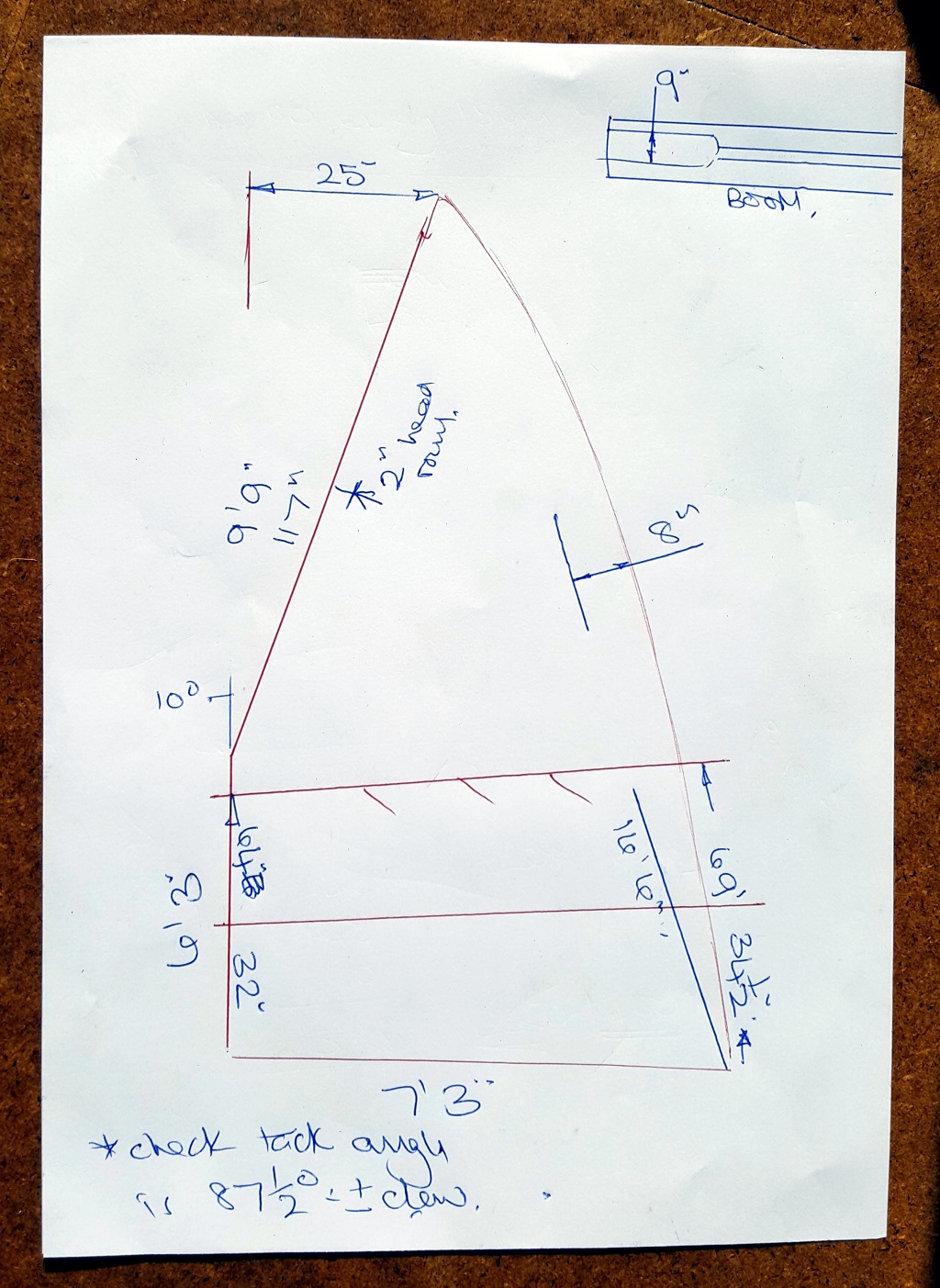 2 lines of reefs are shown, each with a slightly higher clew. Here are some pictures with battens for the new plans: 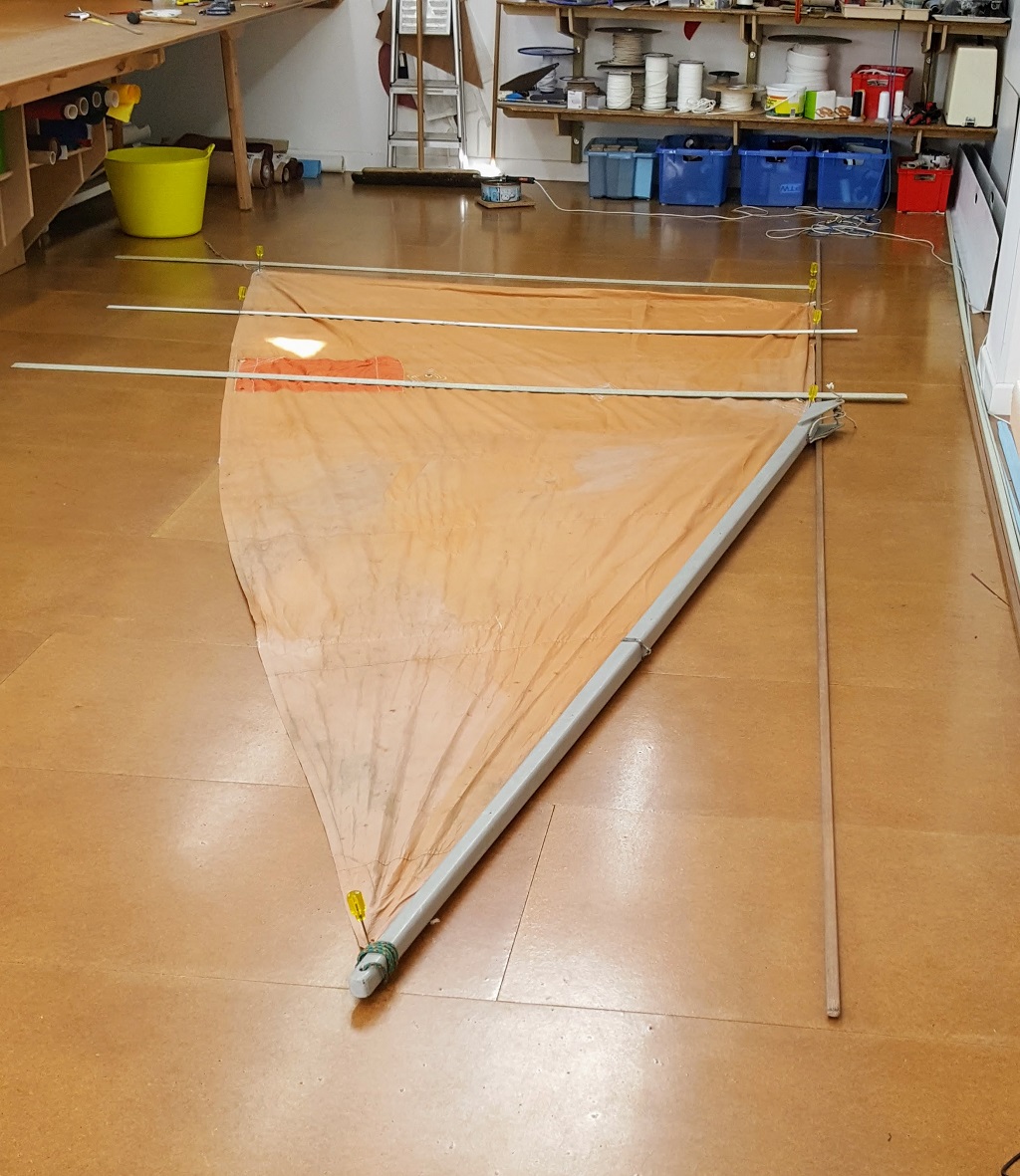 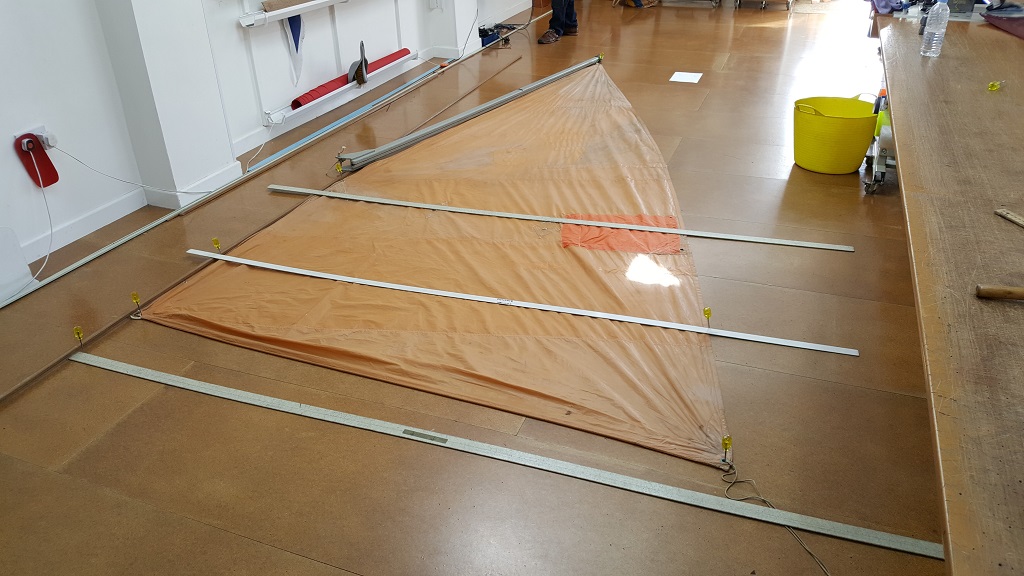 Regarding the Genoa, Dick showed me a genoa with a 4mm bolt rope made from 1x19 stainless wire. The bolt rope was quite stiff and obviously would furl very well, but its flexible enough to lay over the cabin with the mast down. He estimated about £45 to fit a 4mm bolt rope to my Wayfarer Genoa. I was very impressed by the modification and will definitely get the work done. He also sells an upgraded larger version of the Barton furling drum - the larger drum gives more leverage and more room for rope. Feedback is most welcome, especially about the new dimensions. regards Paul |
|
|
This post was updated on .
Dick made the sail for Ardilla and more recently the sail for Ruzvaen (the Ilur I'm building.) Met him when ARdilla was on the Watercraft ABBA display and he gave excellent advice on how to set the sail. He's definitaly good at his trade!
Tim. > On 29 Sep 2017, at 23:08, Paul (admin) [via UK HBBR Forum] <ml+s967333n4030370h83@n3.nabble.com> wrote: > > Today I visited Dick Hannaford who owns R&J Sails near Clevedon, south of Bristol. > |

|
Port-Na-Storm |
Re: When is a Gunter Sail not a Gunter?
|
|
I'm sure there will be others ready to leap in and tell me I'm wrong, but I think the difference between a gunter and high peaked gaff doesn't lie with the sail but the way it is controlled. My Coot has a very high peaked sail which is often mistaken for a gunter but it has two halyards, peak and throat, and is according to the designer a gaff. If it only had one halyard, like a mirror, it would be a gunter.
Now tell me I'm wrong. |

|
David Bewick |
Re: When is a Gunter Sail not a Gunter?
|
|
I'm with you on the gaff/Gunter thing, Grum.
Talking of sails and sailmakers, did anyone see another sailmaker know to several of us, Steven Hall of North Sea Sails, on the BBC programme about Thames barges, last night. Worth a look on I-player if you missed it. |

|
Port-Na-Storm |
Re: When is a Gunter Sail not a Gunter?
|
|
Steve Hall made the sails for both my Whilly Tern and the Coot. I used him on recommendation from Iain Oughtred. I've been very pleased with his work. I've never actually met him only spoken on the phone so I'll definitely check out the programme. Thanks David.
|

|
Chris Waite |
Re: When is a Gunter Sail not a Gunter?
|
|
In reply to this post by Paul H (admin)
OK Paulie
First off, I am pretty sure this is a Jack Holt Vagabond mainsail, not a Vanguard - http://www.noblemarine.co.uk/boats/dinghy/Vagabond/ 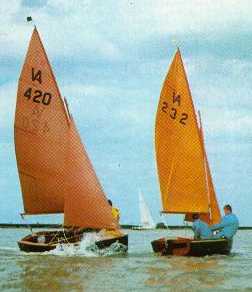 As can be seen, these are gunter rigged and despite my initial opinion, the same as Dick Hannaford's on first seeing your sail laid out on the ground, this one-design dinghy was gunter, not gaff rigged - as has been demonstrated by your sailing Millibee with the peak halyard hauled chock-a-block to the masthead and the sail setting perfectly. As you have previously decided on a second (throat) halyard, the ten degree, high-peaked gaff design is just what the doctor ordered some time ago.... Well, didn't he? It looks fine to me and gives much better draught and leach control; though as you know, I would find some other way to make up the sail area (probably a slightly longer luff), so I didn't require the extra fiddle of a battened roach. Having the boom cocked up slightly is also a good move, giving you more headroom in the cockpit and making it less likely to go for a dip when rolling in a quartering sea. The roller furling also seems an improvement, if you intend going that way. Good CW |

|
Paul H (admin) |
Re: When is a Gunter Sail not a Gunter?
|
|
Chris,
Those sail markings (VA) are 100% identical to my sail, which was VA 67 with a Jack Holt badge. Here is a photo of a later sail number: 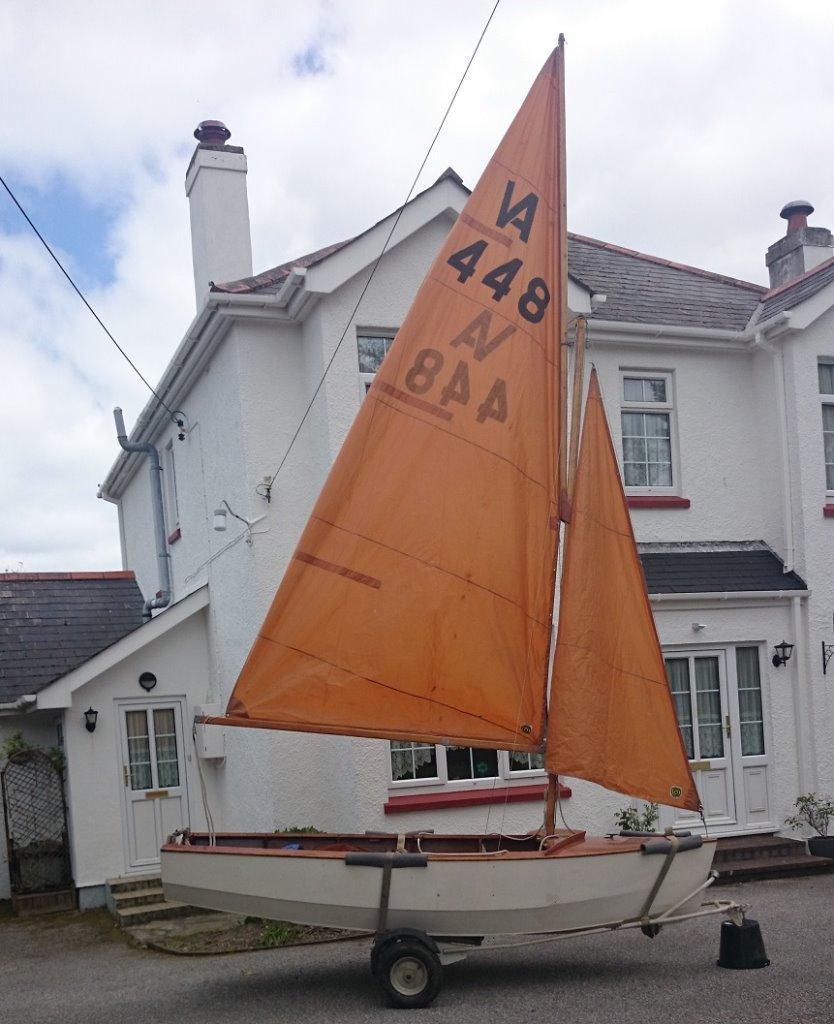 Notice the vertical creases. I remove those by opening the gaff slightly and keeping the throat halyard tight. I can also see a slight gaff angle in both boats in your picture. My view is that Jack Holt did design a Gunter rig with one uphaul (like the Mirror later) to keep the boat simple and cheap for the average man. However by cutting the Vagabond sail with a slight angle one can experiment with different sail fullness by easing the uphaul slightly. To sort out the confusion I have overlaid my Mirror and Vagabond sails with the foot's parallel and the first metre of the luff's parallel. The Vagabond definitely has more bend in the luff, and the Mirror luff seems to be much straighter: 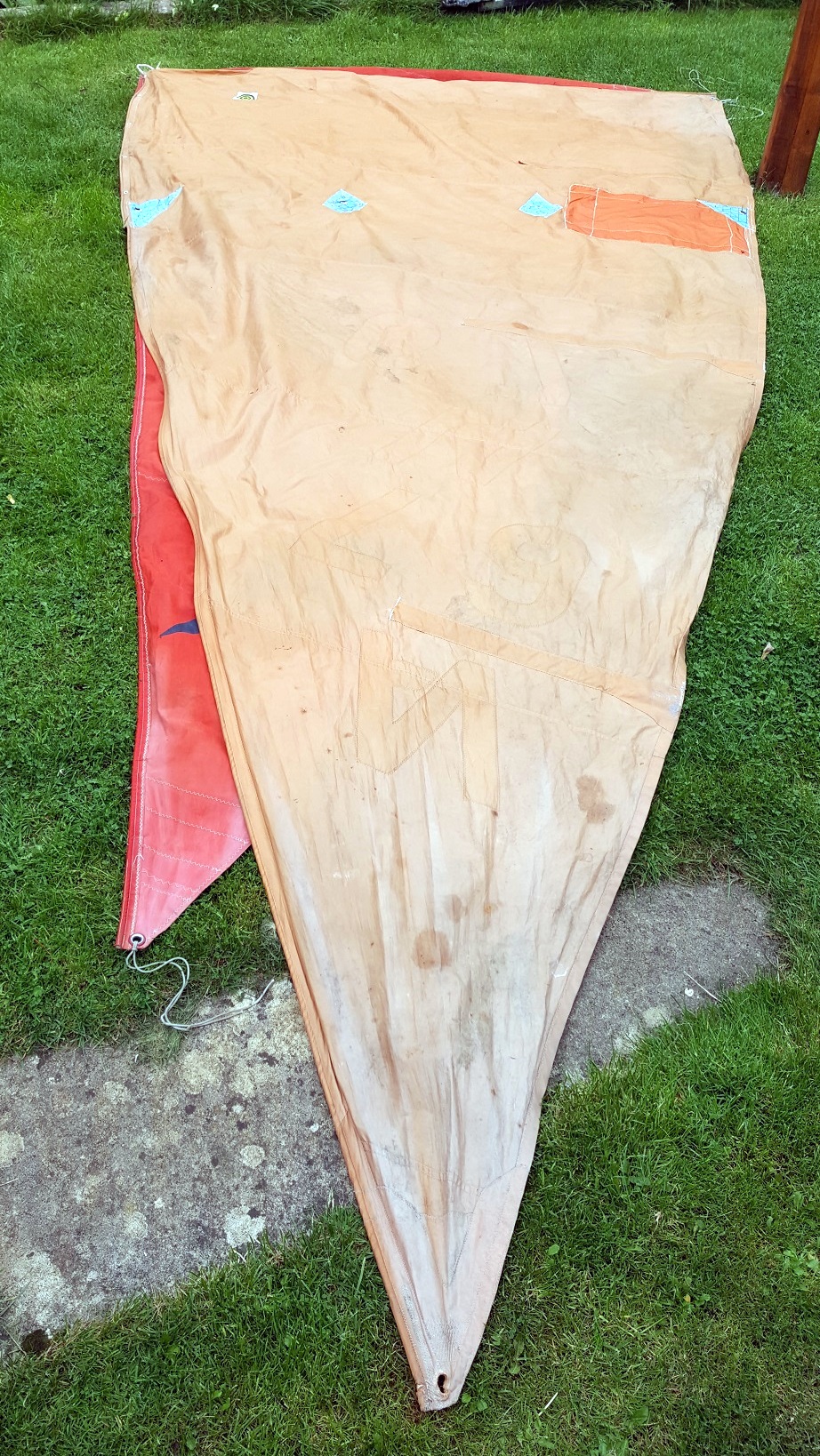 Quite what Jack Holt had in his mind when he designed both boats we will never know. I just know I like how the Vagabond sail performs with a genoa on MilliBee . cheers all Paul |

|
Chris Waite |
Re: When is a Gunter Sail not a Gunter?
|
|
Paul
I agree the luff-to-head on the Vagabond sail is rather more open than the Mirror, which is what fooled myself and I presume Dick. The other tell-tale indicator of a true gunter rig is that there is no fitting at the throat to attach a halyard there. Remember that you had to drive an eye into the starboard cheek of the jaws to achieve that. Actually the Vagabond and Gull hulls look almost identical, yes? The fact that the Mirror luff/head is about straight indicates that the earlier Vagabond version was found to be less effective; either that, or modern sailmaker's do not really understand the gunter rig. The vertical creases are what should appear when such a sail is set up correctly, but has no wind in it. The creases disappear as the rig comes onto the wind and reappear as the boat bears away, when the peak halyard should be slackened off a tad until they vanish again. This is additionally confused of course by 448's over tension of the head along the yard in this picture and incidentally lack of battens in the pockets. Where have I seen that before? Well just batten down My main CW |
«
Return to General Discussion
|
1 view|%1 views
| Free forum by Nabble | Edit this page |
